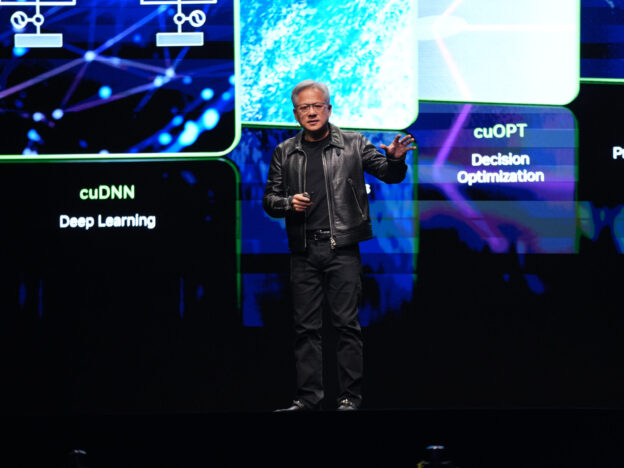Today, I want to share 15 life and work quotes from Jensen Huang (NVIDIA’s CEO).
Jensen cleaned toilets and washed dishes before leading NVIDIA to become the most valuable company in the world.
I watched 10+ hours of Jensen interviews to get inside the mind of the world’s most impressive Asian dad. Below are my 15 favorite Jensen quotes on:
- Leadership
- Strategy
- Personal growth
I’ve also included my personal thoughts a few quotes. Let’s dive in
1. “My goal is to create the conditions where amazing people come to do their life’s work.”
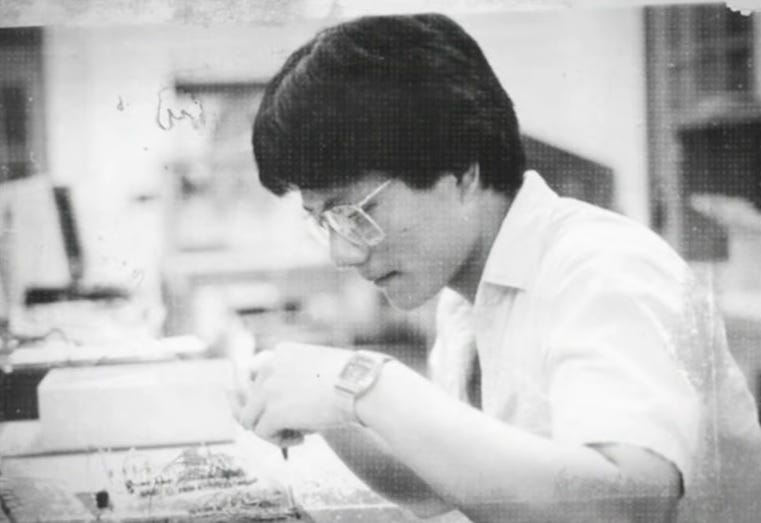
“I think there are three conditions for people to do their life’s work:
- Empower them with information. I don’t make decisions where only one person needs to hear them. I prefer environments where a diverse team of experts and people can work on a problem together.
- Reason through problems publicly. It’s incredibly empowering to take an abstract idea and reason it down to precisely what we should or should not do.
- Full stack company. I try to encourage experts and contributors at every single layer of the company to be engaged with a problem at the same time.”
I love how much Jensen emphasizes transparency and public discourse to encourage everyone at the company to contribute to NVIDIA’s mission.
2. “I have 60 direct reports, and I don’t do 1 on 1s.”
Your contribution should not be based on privileged access to information.
“I don’t do one-on-ones. Almost everything that I say, I say to everybody at the same time. I don’t believe there’s any information that only 1-2 people should hear about.
I love that everybody’s working off of the same song sheet. I love that we’re able to all contribute to solving a problem. Everybody hears the reasoning behind the problem and the solution.”
I think Jensen’s approach works for senior leaders but for most employees, 1:1s remain a critical forum to discuss career growth and challenges. It’s the employee that needs the 1:1, not the manager.
3. “I give feedback right in front of everyone.”
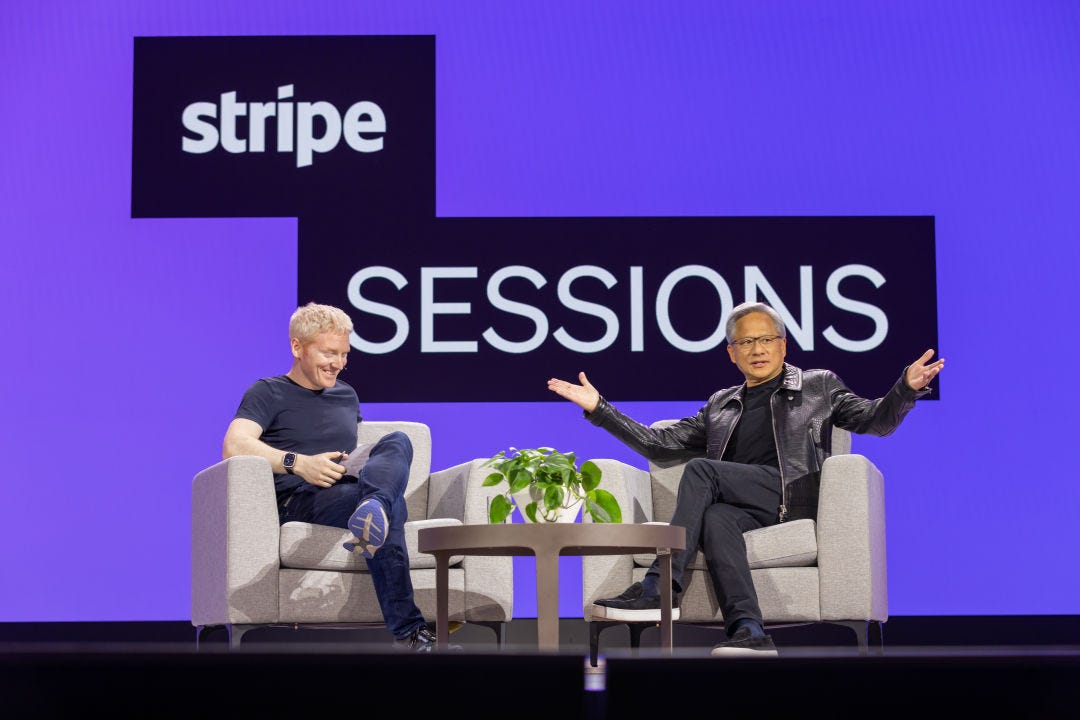
Nothing makes us happier than learning from other people’s disasters.
“This is a big deal. First of all, feedback is learning. For what reason are you the only person who should learn this?
You created the conditions because of some mistake or silliness you brought upon yourself. We should all learn from that opportunity.
Learning from other people’s mistakes is the best. Why learn from your embarrassment? It’s much better to learn from other people’s embarrassment.”
This runs counter to the “praise publicly and criticize privately” advice. I think it’s important to learn from product failures publicly, but giving public individual feedback only works if you can do it in a constructive way.
4. “I spent alot of time reasoning with decisions.”
“I spend a lot of time reasoning through my decisions, which empowers employees because they learn how leaders think through problems.
In every meeting, I explain how I think through the situation: Let me reason through this, explain why I did that, and how we compare and contrast ideas.
That process of management, I think, is empowering.”
I love this principle, and it’s also why I love written communication. As Jeff Bezos says, “There is no way to write a six-page, narratively structured memo without clear thinking.” Memos can also be easily shared with the entire company.
5. “We don’t do just vice president meetings or director or board meetings.”
“At the meetings I have, there are new college grads there. There are people from every different organization. We are just all sitting in there.
You want the most informed, best-skilled person to be there. They either made the mess, or they confronted the situation.”
At many companies, middle management controls access to information. But the best VPs and directors I’ve worked with are candid and transparent. Your reports need to know the broader picture to do their job well.
6. “I very seldom fire people — I’d rather torture them to greatness.”
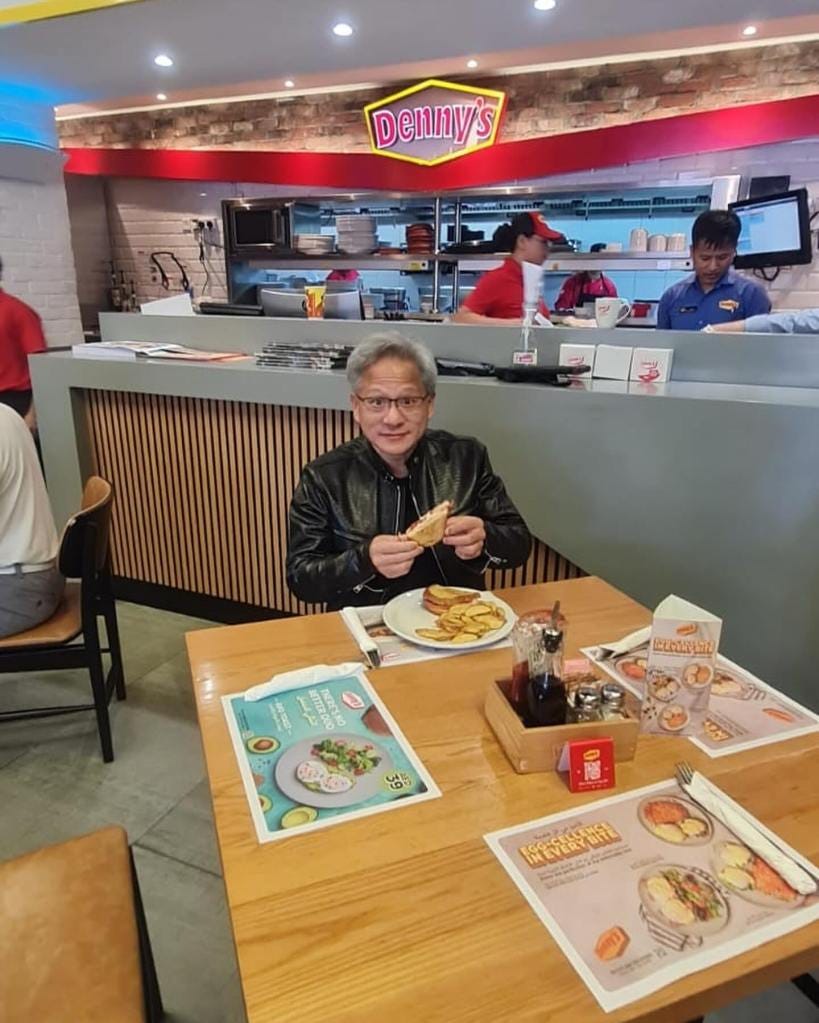
“Look, I used to clean bathrooms, and now I’m the CEO of a company. You just have to be allowed to learn. I don’t like giving up on people.
I’d rather torture you into greatness because I believe in you.
Greatness comes all of a sudden one day. Do you know what I’m saying? That feeling that you didn’t get it yesterday, and suddenly, something clicked one day? Could you imagine giving up on that moment just before you got it?
So I’ll just keep torturing you instead.”
This sounds great, but sometimes people just aren’t a great fit for a specific role. I think this advice resonates more for people who are already performing at a high level and want to excel further.

7. “I love zero-billion dollar markets.”

“Our purpose should be to do something that has never been done.
Those markets are zero billion dollars in size.
We never talk about market share. The whole concept of market share says a bunch of other people are doing the same thing. Why would I squander the lives of these incredibly talented people to do something that has already been done?
Because we selected amazing markets and hard-to-do things, amazing people joined us… that’s how you build something special.”
8. “Deciding what to give up on is at the core of success.”
“The phone market is huge; we could have chosen to fight for share. Instead, we made a hard decision and sacrificed the market…
Nvidia’s mission is to build computers to solve problems that ordinary computers cannot. We should dedicate ourselves to realizing that vision.
Our strategic retreat paid off. By leaving the phone market, we opened our minds to invent a new one. Retreating from a giant phone market to create a $0 billion market was risky, but it paid off.
Retreat does not come quickly to the brightest people, yet strategic retreat, sacrifice, and deciding what to give up are at the core of success.”
9. “Strategy isn’t words; strategy is action.”
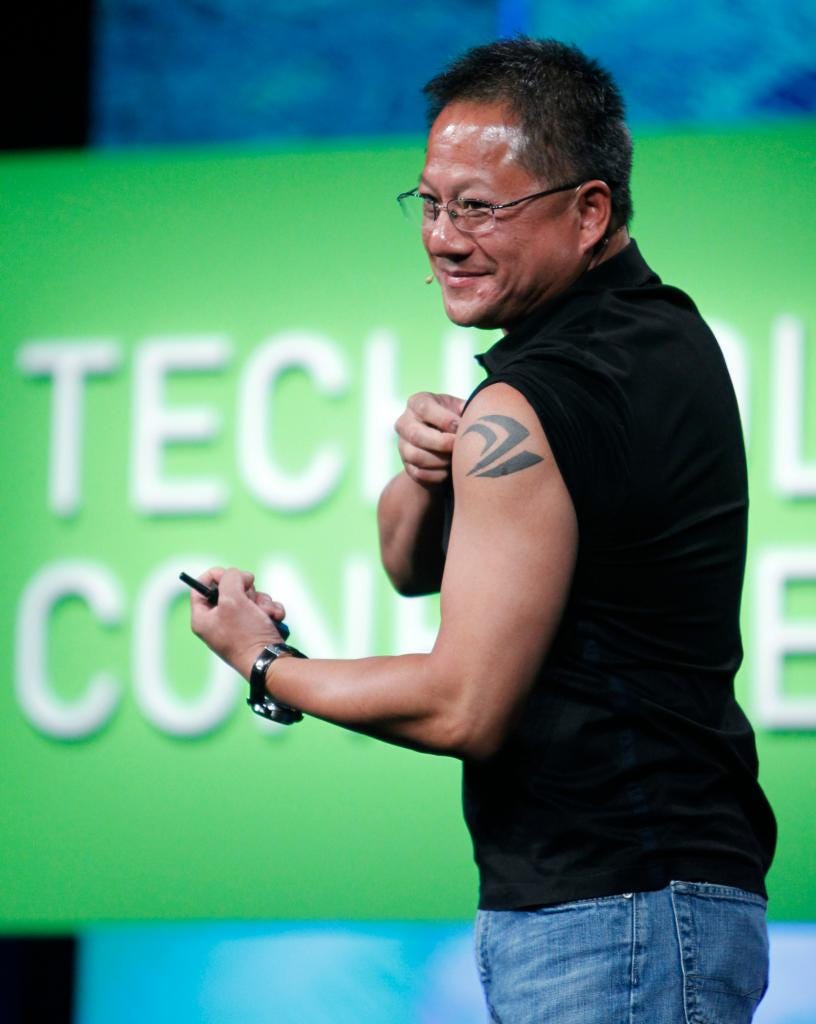
“If the company has a set of strategies, but the people’s actions, their top five things are not that, then they’re not executing the plan.
So strategy isn’t what I say; it’s what my employees do. That’s why it’s so crucial for me to understand what everyone’s doing. I do that by getting a feel for everybody’s top five things. You see, we don’t do status reports. Instead:
If you send an email called “Top Five Things” to me, I’ll probably read it.
It’s just whatever happens to be your top 5 things — what you observed, did, or learned. I probably read a hundred or so of these emails every morning.
We also don’t have a periodic planning system. The world is a living, breathing thing, so we plan continuously. So there’s no long-term plan — it’s just what we do.”
At many companies, each management layer wastes so much time packaging up information for the CEO (e.g., long status updates and slides). I love that Jensen is willing to read an update from any employee. I wonder how many lower-level employees send him these updates, though.

10. “I wish upon you ample doses of pain and suffering.”
That’s my way of saying I wish you greatness.
“There’s a belief that you should choose your career based on your passion. Usually, people connect passion with happiness. I think something is missing.
If you want to build something great, it’s not easy. And when you’re doing something difficult, you’re not always enjoying it. I don’t love every day of my job, but I love the company every single second.
And so I think that people misunderstand that the best jobs are the ones that always bring you happiness. I don’t think that’s right. You have to suffer, struggle, and endeavor. You must do those hard things and work through them to appreciate what you accomplish.”
Pursuing your passion should be rephrased as choosing the suffering that you love. Suffering is unavoidable if you want to achieve something great.
11. “People with very high expectations have very low resilience”
Unfortunately, resilience matters in success.
To me, no task is beneath me. Because remember I used to wash dishes, and I used to clean toilets. I cleaned a lot of toilets. I’ve cleaned more toilets than all of you combined and some of them… I just can’t unsee. I don’t know what to tell you. That’s life,
This is absolutely true. I’ve seen plenty of straight-A Ivy-league students struggle when they enter the real world. The most successful people are the most comfortable with failure. I’m trying to teach my kids about failure early.
12. “Have the humility to confront failure and get help.”
“I contacted the CEO of Sega and explained that our invention was the wrong approach and that Sega should find another partner.
We had to stop. But I needed Sega to pay us in whole or NVIDIA would be out of business. I was embarrassed to ask.
The CEO of Sega, to his credit and my amazement, agreed.
His understanding and generosity gave us six months to live. With that, we built Riva 128. Just as we ran out of money, Riva 128 shocked the young 3D Market, put us on the map, and saved the company.
Confronting our mistake and, with humility, asking for help saved NVIDIA. These traits are the hardest for the brightest and most successful.”
It takes true humility to admit that you need help and ask for it. We should all ask for help more often and proactively help the people around us who need it.”
13. “Either you’re running for food, or you are food.”

“Run, don’t walk. Either you’re running for food, or you are running from being food.”
“You should choose something that’s somehow you’re destined to do. Either a set of qualities about your personality or expertise or the people you’re surrounded by, your scale, your perspective, whatever you’re somehow destined to do.”
“You better love working on that thing so much because the pain and suffering is too great… People who can suffer are ultimately the ones that are the most successful.”
As Andy Johns (Intel CEO) says: “Only the paranoid survive!”
14. “When I’m not working, I’m thinking about working.”
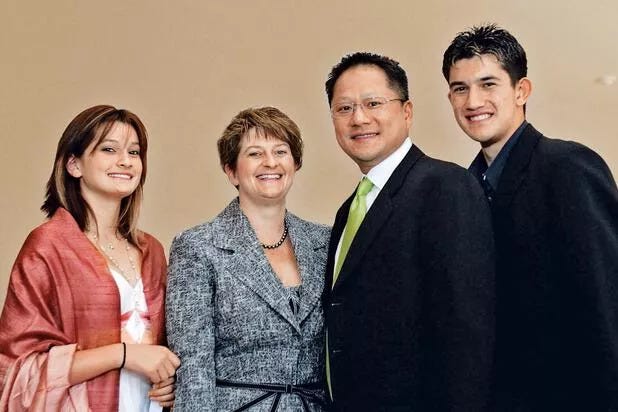
“I think my work-life balance is excellent. I work from when I wake up to when I go to bed, seven days a week. When I’m not working, I think about working.
So I sit through movies, but I don’t remember because I’m thinking about work. I’m thinking about what the company can be. Are there things that we could do even better?
Sometimes, it’s just trying to solve a problem, but sometimes, you’re imagining the future. “Boy, if we did this and that” — it’s working, you’re fantasizing, you’re dreaming.
I try to live a life of purpose and manage my time accordingly.”
I can see how if you’re doing your life’s work, you can’t help but think about it all the time.
15. “I have plenty of time to do my life’s work.”

“I noticed the lone gardener. Now, remember, the moss garden in the Silver Pavilion is gigantic and it’s just exquisitely maintained.
I noticed the lone gardener squatting, carefully picking at the moss with a bamboo tweezer and putting it in the bamboo basket. And you have to, it’s a bamboo tweezer, you know, and it’s just this one gardener.
And so I walked up to him and said, “What are you doing?” And in his English, he said, “I’m picking dead moss. I’m taking care of my garden.” And I said, “But your garden is so big. And he responded, “I have cared for my garden for 25 years.”
“I have plenty of time.”
Well, that was one of the most profound learnings in my life. This gardener has dedicated himself to his craft and doing his life’s work. And when you do that, you have plenty of time.
I begin each morning exactly the same way: by doing my highest priority work first. Before I even get to work, my day is already a success. I’ve already completed my most important work and can dedicate my day to helping others.”
Jensen’s story highlights the importance of finding your craft and making time to prioritize your long-term goals.
https://creatoreconomy.so/p/15-life-and-work-principles-from-jensen




